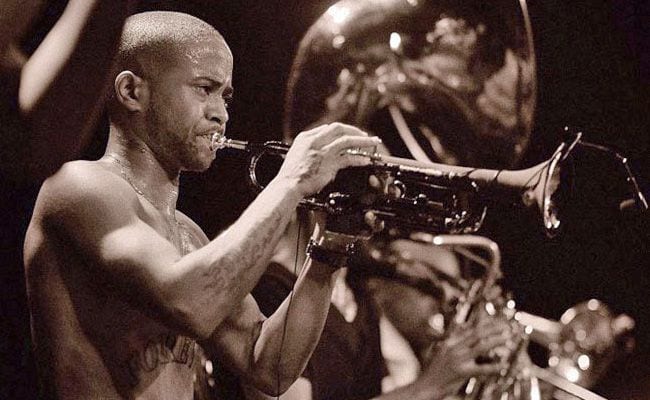
Editor’s note: Brothers Hypnotic is screening this week at Maysles Documentary Center. Screenings on Friday, 28 March and Saturday, 29 March will be followed by Q&As with director Reuben Atlas and Hypnotic Brass members. The film premieres on 7 April on PBS’ Independent Lens.
“It’s about y’all. Y’all are gonna run the world someday.” Tarik Graves squats on the sidewalk, signing CDs and music sheets for a crowd of little kids. The camera is level with those children and Tarik, who goes by the name of Smoove, which is to say, it’s low and close, intimate and mobile. Cut to a next moment, when Smoove is standing alongside a yellow school bus. He looks back over his shoulder to the camera, asserting, again, “That’s what it’s all about, yo.” He runs alongside the bus, touching hands extended from inside, then trots across the street to find another bus, where he touches more hands, reaches out to more kids, as he spins and laughs, delighted.
This brief sequence in Brothers Hypnotic, vivid and exhilarating, is both anomalous and typical, focused on the youngest member of the Chicago-based Hypnotic Brass Ensemble, as well as the youngest son of trumpeter Phil Cohran. Smoove’s enthusiasm is infectious and informative too: this is what it’s “all about,” what the band does, what the family believes, in the energy and future of children, the legacy they might pass on, the culture they embody and share. For Smoove and his seven brothers, born to two mothers who raised them together on Chicago’s South side. Inspired and instructed by their father, the boys grew up playing together.
As much as the film celebrates their music, with long sequences devoted to their energetic performances, it also makes clear the hard work that goes into it. Their training, you see, was rigorous and technical, in the sense that they mastered the art of playing horns — trumpets, French horns, trombones, tubas — but it was also emotional and spiritual, an education in how to live, how to commit, how to survive. “Long tones were the first thing we ever learned,” says trumpeter Cid at the start of the film. “So every time we start out with that because it’s the principle of simplicity. The most basic thing is one note.”
As he speaks, the camera is close on a set of instruments, one at a time, each playing a long tone, prolonged, as each horn fills the screen. This comes after the camera has followed the brothers walking along Chicago train tracks, watching them from overhead and from low to the ground, through fencing or train car doors. Such precise framing underlines the case about the long tones, each shot reinforcing the visual referent of the tracks and the train, historic, rhythmic, long. As they talk, they play, the soundtrack layering voices and long notes, another gesture toward the theme, the survival of sound and players too.
Brothers Hypnotic introduces the band as a function of their dad, his progeny, his project even as they have also become devoted artists in their own right. For years, throughout their childhood, the brothers revered their father, as well as his decision to leave behind commercial music, to play with Sun Ra and raise his family according to an Afrocentric philosophy. “Our father explained to us that the neighborhood was so impoverished and full of crime,” says Cid, “Because we were living in a neighborhood that was full of people that didn’t have any self-love. They taught everybody that young black men were stupid and [you] can’t teach them.” He and his brothers, Cid concludes, are “the opposite of that,” educated and respectful of themselves, each other, and the culture that made them.
This much seems clear in photos and home movies of the young boys playing music, their eyes on their dad, sometimes glancing toward the camera and whomever might have been recording them. Some photos suggest the boys’ relationships with their mothers, Maia and Aquilla, who plays the harp. “Aqulilla and I were good friends,” says Maia now. “We were raising our children to be respectable assets to the world, that was our intention.” As Brothers Hypnotic reveals that the mothers achieved their intention, it doesn’t spend much time working out the details of their own complicated experiences; rather, true to its title, the documentary remains focused on the brothers, in particular as they rethink how to sustain their legacy and how to forge their own paths, how to play one note and also many.
This rethinking takes the brothers from the streets or small venues in Chicago and other cities, to something like a relationship with the commercial industry, the one their father rejected so many years ago. In part, they reason, this shift is a means to sustain the very legacy they so value, to make their music available to increasing numbers of people; to this end, they hire an agent (actually, a couple of agents, as they replace the first a few months into their new adventure). In part, the shift is inspired by attention the band gets from artists who have found ways to negotiate with the industry, including Mos Def, Prince, and Damon Albarn, and in part it’s a result of their own maturing, as they negotiate their own complicated and very different relationships with Cohran.
While the “brothers” do tend to be grouped and perceived as such, as a remarkable blood-related cohort, Brothers Hypnotic shows as well their experiences as individuals. And as individuals, they choose to reform as a band and recommit to their art as a unit. The family is both a start and eternal, much like their music.


![Call for Papers: All Things Reconsidered [MUSIC] May-August 2024](https://www.popmatters.com/wp-content/uploads/2024/04/all-things-reconsidered-call-music-may-2024-720x380.jpg)



